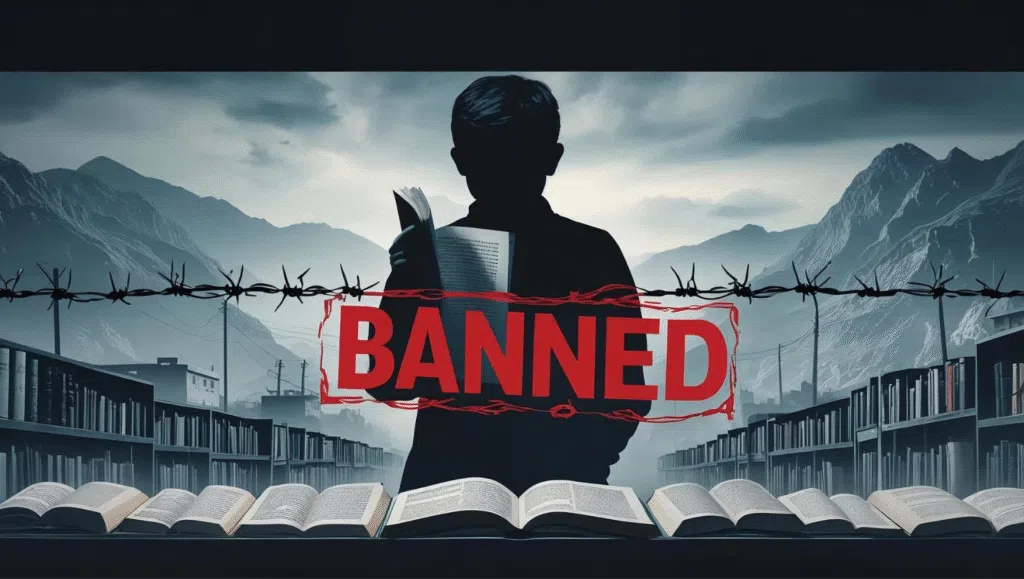An examination of the recent prohibition of academic works and its implications for intellectual freedom in India’s most contentious region

The recent decision by Jammu and Kashmir’s administration to prohibit 25 scholarly publications has ignited a fierce debate about the boundaries of intellectual expression in India’s most heavily militarized territory. This sweeping censorship directive, issued under the Bharatiya Nyaya Sanhita 2023, represents far more than a simple regulatory action—it embodies a fundamental tension between state security concerns and democratic principles of free inquiry.
The Scope and Scale of Intellectual Suppression
On August 5, 2025—marking the sixth anniversary of Article 370’s revocation—the Home Department of the Union Territory declared 25 academic works “forfeited” under criminal law provisions. This unprecedented action targeted scholarly publications spanning decades of research, including constitutional analyses, historical examinations, and journalistic investigations into the Kashmir conflict.
The prohibited works encompass diverse academic perspectives from internationally recognized scholars. Among the banned titles are Hafsa Kanjwal’s “Colonizing Kashmir: State-building Under Indian Occupation,” Sumantra Bose’s “Kashmir at the Crossroads,” and Victoria Schofield’s “Kashmir in Conflict.” These publications represent years of meticulous research conducted by academics affiliated with prestigious institutions worldwide, including Stanford University, London School of Economics, and various Oxford presses.
Particularly striking is the inclusion of Arundhati Roy’s “Azadi: Freedom, Fascism, Fiction,” a collection of essays by the Booker Prize-winning author, alongside constitutional expert A.G. Noorani’s comprehensive legal analysis “The Kashmir Dispute 1947-2012.” These works have circulated freely for years in academic circles globally, suggesting that their “threat” lies not in their content per se, but in their alternative interpretations of historical events.
The Justification Framework: Security Versus Scholarship
Government officials defended the prohibition by asserting that these publications “propagate false narratives and secessionism,” claiming they contribute to youth radicalization through “distortion of historical facts” and “glorification of terrorists.” The official notification characterizes the banned literature as fostering “a culture of grievance, victimhood, and terrorist heroism” among Kashmir’s young population.
This justification framework reveals a troubling assumption: that scholarly analysis itself constitutes a security threat. The administration’s position suggests that any examination of Kashmir’s complex history that deviates from official narratives automatically becomes dangerous propaganda. Such reasoning fundamentally misunderstands the nature of academic inquiry, which thrives on multiple perspectives and critical examination of established viewpoints.
The timing of this prohibition—coinciding with the Article 370 revocation anniversary—appears deliberately symbolic rather than responses to immediate security concerns. This strategic messaging suggests the ban serves broader political objectives beyond addressing specific public safety threats.
International Academic Response and Scholarly Freedom
The global academic community has responded with alarm to what many characterize as an assault on intellectual freedom. Scholars whose works were targeted have uniformly rejected allegations of promoting terrorism or violence, instead emphasizing their commitment to peaceful resolution through understanding and dialogue.
Sumantra Bose, whose two books were banned, stated his research objective has always been “to identify pathways to peace so that all violence ends.” This sentiment reflects the broader scholarly consensus that understanding conflict dynamics through rigorous analysis contributes to resolution rather than escalation.
British historian Victoria Schofield described the allegations as “patently untrue,” noting the irony that her work had circulated freely in India for decades. This historical context raises questions about what has changed—not in the books’ content, but in the political environment’s tolerance for diverse perspectives.
The prohibition extends beyond individual authors to entire academic disciplines. Works on human rights documentation, gender studies in conflict zones, and comparative conflict analysis have all fallen under suspicion. This broad sweep suggests an institutional fear of scholarly inquiry itself rather than specific security concerns.
The Enforcement Apparatus: From Theory to Practice
Implementation of the book ban revealed the extensive apparatus of censorship now operating in Kashmir. Police conducted coordinated raids across multiple districts, searching bookshops, educational institutions, and even the ongoing Chinar Book Festival—creating the absurd spectacle of promoting literature while simultaneously prohibiting it.
These enforcement actions transformed booksellers and librarians into unwilling agents of censorship, forcing them to self-police their collections under threat of criminal prosecution. The psychological impact extends far beyond the 25 specific titles, creating an atmosphere where any critical work becomes potentially suspect.
The raids yielded few actual books, suggesting either that these works were never widely circulated locally or that the market had already internalized censorship expectations. This outcome paradoxically undermines the government’s claims about these books’ widespread influence while simultaneously demonstrating the chilling effect of threatened prosecution.
Democratic Institutions Under Pressure
The book prohibition represents a broader pattern of institutional changes in Kashmir since 2019. The region’s transformation from a state with elected representation to a Union Territory under direct central control has facilitated increasingly authoritarian measures without local legislative oversight.
Lieutenant Governor Manoj Sinha, as New Delhi’s appointed administrator, exercises extraordinary powers that elected officials would find difficult to justify to constituents. This institutional structure enables top-down censorship decisions without democratic accountability or public debate.
The elimination of meaningful local governance has created a democratic deficit where policies affecting Kashmir’s population are formulated in distant offices without input from those most directly impacted. The book ban exemplifies this disconnect between governance and consent.
The Paradox of Information Control in the Digital Age
Attempting to suppress information through book bans in 2025 reveals a fundamental misunderstanding of contemporary information flows. Digital copies of banned works remain widely accessible through online platforms, academic databases, and international libraries.
This technological reality renders physical book bans largely symbolic rather than practically effective at controlling information access. The prohibition may actually increase interest in these works by conferring forbidden fruit status upon previously obscure academic publications.
The government’s simultaneous celebration of literacy through book festivals while banning specific titles creates cognitive dissonance that undermines public confidence in official messaging. Such contradictions highlight the theatrical rather than substantive nature of these censorship measures.
Historical Precedents and Dangerous Trajectories
Book banning carries historical baggage that democratic societies typically associate with authoritarian regimes. The 1933 Nazi book burnings, Stalin’s literary purges, and similar campaigns throughout history demonstrate how targeting intellectual expression often precedes broader democratic erosion.
India’s own colonial experience with British censorship should inform contemporary policy debates. Many works now celebrated as foundational to Indian independence were once prohibited by colonial administrators who similarly claimed security justifications for suppressing alternative narratives.
The current prohibition recalls McCarthyism in 1950s America, where books were removed from libraries based on ideological content rather than educational merit. These historical parallels suggest that today’s censorship may be remembered as a dark chapter in India’s democratic journey.
Regional Implications and National Consequences
While the immediate impact affects Kashmir, the precedent established has national implications. Other state governments may view successful censorship in Kashmir as license for similar actions in their jurisdictions, potentially normalizing book bans as routine governance tools.
The erosion of academic freedom in one region weakens intellectual discourse nationwide. Scholars studying sensitive topics elsewhere may self-censor to avoid similar targeting, leading to impoverished public understanding of complex issues.
International perceptions of India as a democratic society committed to free expression suffer when authoritarian measures are employed in disputed territories. Such actions undermine India’s soft power and moral authority in global forums.
The Path Forward: Principles Over Politics
Addressing Kashmir’s challenges requires embracing complexity rather than suppressing it. Genuine security comes from understanding grievances and addressing legitimate concerns through democratic processes, not from silencing critical voices.
Academic freedom serves democratic societies by providing independent analysis of government policies and social conditions. This function becomes even more critical in conflict zones where official narratives may obscure important truths.
The current book ban represents a missed opportunity to demonstrate confidence in Kashmir’s integration with India. A secure and confident administration would welcome scholarly scrutiny rather than fear it, using criticism as a tool for improvement rather than evidence of disloyalty.
Beyond Censorship: Constructive Alternatives
Rather than prohibiting books, authorities could engage constructively with their arguments through reasoned response and counter-narrative. Intellectual debates strengthen democracy by exposing weak arguments to scrutiny while reinforcing valid positions through evidence.
Educational initiatives could help young Kashmiris develop critical thinking skills to evaluate diverse perspectives independently rather than requiring government curators to determine appropriate reading material. Such approaches respect human dignity while building analytical capabilities.
Transparent governance practices would reduce suspicions that fuel critical scholarship by demonstrating accountability and responsiveness to legitimate concerns. Openness breeds trust while secrecy feeds conspiracy theories.
Conclusion: The True Test of Democratic Maturity
The book ban controversy in Kashmir ultimately tests India’s commitment to democratic principles under pressure. Mature democracies distinguish themselves by protecting minority viewpoints and dissenting voices even when—especially when—those perspectives challenge official positions.
True national security emerges from the strength of democratic institutions and public trust in governance, not from the suppression of critical voices. A confident nation addresses criticism through better performance rather than censorship.
The choice facing policymakers is clear: continue down the path of authoritarian control that treats citizens as subjects requiring protection from dangerous ideas, or embrace democratic principles that trust citizens to evaluate competing perspectives and make informed judgments.
History will judge whether India chose the path of intellectual freedom or the dead end of censorship. The books may be banned, but the ideas they contain—and the principles they represent—cannot be so easily suppressed. In the end, the true test is not whether the government can silence critics, but whether it possesses the wisdom and confidence to let democracy’s marketplace of ideas operate freely.
The future of Kashmir, and indeed of India itself, may well depend on making the right choice.







